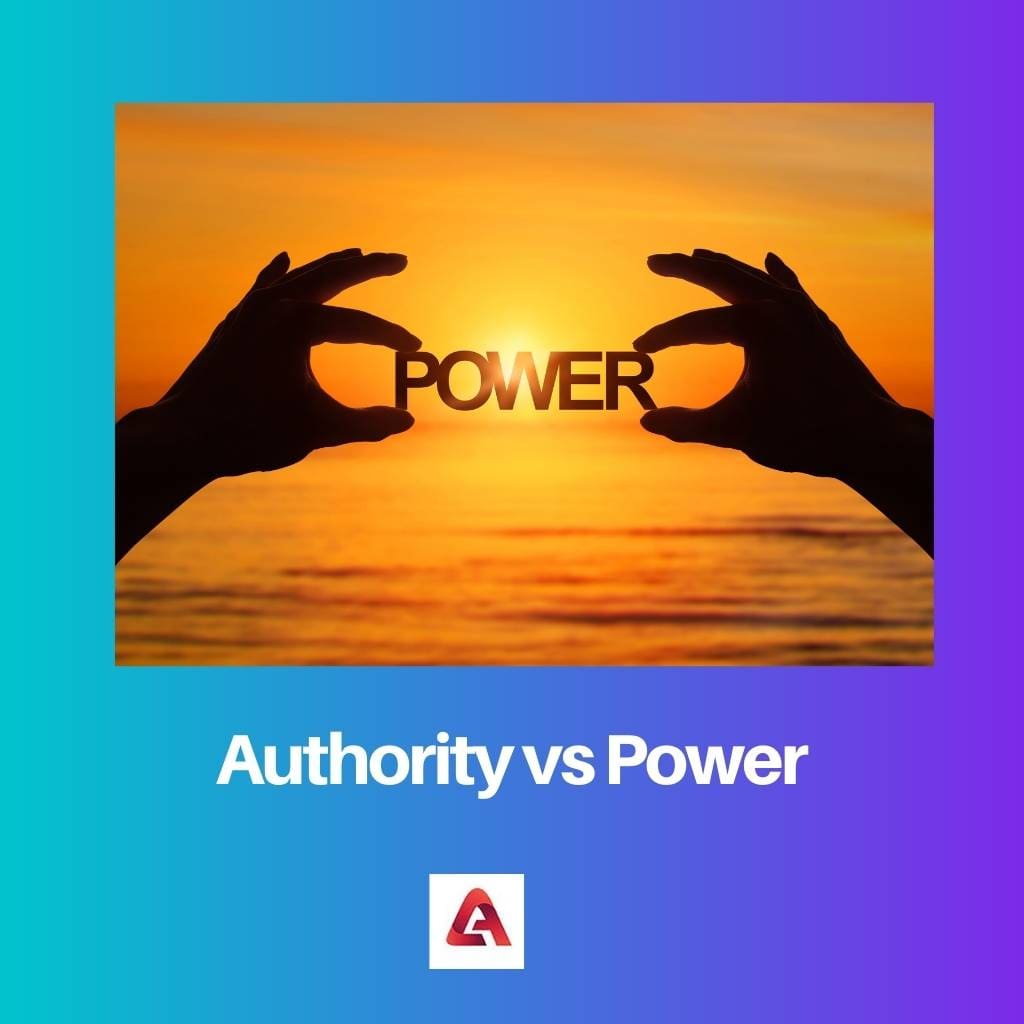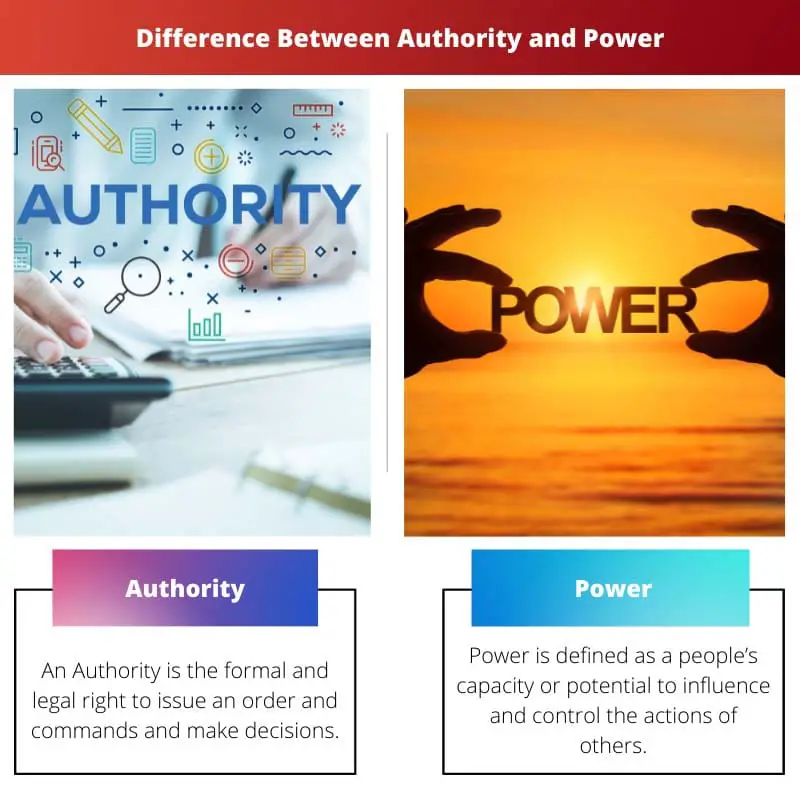When it comes to influencing or modifying others, two situations go hand in hand in the field of management: power and authority. These two are used to compel people to act in a specific way.
Many people believe that power and authority are synonymous, but there is a fine line between the two. It is meaningful to know the difference between them.
Key Takeaways
- Authority derives from a legitimate source or position, while power can come from various sources, including force or coercion.
- Authority is consent-based, meaning people voluntarily comply with rules or decisions, while power can involve compliance through fear or intimidation.
- Authority implies a recognized right to make decisions and enforce rules, while power does not necessarily entail such recognition.
Authority vs Power
Authority is the control delegated to an individual or group, while power is the control that allows influence on others. Authority is technical and static, while power is flexible and dynamic. Authority comes from a legally allotted position, while power can diffuse from one to another.

A formal designation or leadership role that gives someone the ability to influence others within their organization is referred to as authority.
A person in positions of authority is frequently powerful, but power is not required for authority. Many hierarchical systems and organizations rely on authority to function quickly and efficiently.
On the other hand, Power is known as a person’s capacity or power to affect the belief systems, motives, or behavioural patterns of others.
To become powerful, a person or organization doesn’t seem to have any prominent place inside a hierarchy.
For example, even if they do not hold a managerial title, an employee with high experience and technical expertise will become powerful and influential to their peer group, supervisors, and customers.
Comparison Table
| Parameters of Comparison | Authority | Power |
|---|---|---|
| Definition | An Authority is the formal and legal right to issue an order and commands and make decisions. | Power is defined as a people’s capacity or potential to influence and control the actions of others |
| What exactly should it be? | It is an official right, granted to high-ranking representatives. | It is a personality trait. |
| Hierarchy | The hierarchy is followed by authority. | There is no hierarchy of power. |
| Exists with | Designation | Individual |
| Source | Position and location | Competence and knowledge |
| Acceptable | Yes | No |
What is Authority?
Authority is defined as the legitimate power that a person or a group of individual people possesses and exercises over others.
This is referred to as legitimate power, as it refers to the power that individuals agree to follow according to specific procedures.
They obey or listen to people in positions of authority even though they believe these people are fundamentally respected or just because they believe they deserve respect.
A typical example of how people communicate with figures of authority in daily situations is an encounter between a police officer and a regular citizen in the country.
Other figures of authority that people acknowledge are public officials and elected representatives.
It is bestowed upon high-ranking officials to achieve the organization’s goals. It is centralized, flowing downward, that is, assigned from leader to subservient. In particular, authority is used to accomplish tasks through the use of others.
It is affixed to the role, which means that anyone who obtains the position enjoys the authority that comes with it; the higher the position, the greater his authority.
Because the authority is in the designation, the position offered to the person would be useless in the absence of authority. Furthermore, it is limited to the organization.
German Sociologist, Max Weber, distinguished three types of authority: traditional authority, charismatic authority, and legal-rational authority. The legitimacy of power exists in traditional authority leading to heavy culture.
People accept charismatic authority because of the leader’s personal characteristics. Further to that, in the case of legal-rational authority, the power is legitimized through laws and written rules.

What is Power?
The term power refers to an individual’s personal ability to persuade others to do or not do something. It is self-sufficient and unofficial in nature, owing to its status. It is a learned skill derived from knowledge and experience.
It is the right to direct the behaviour, choices, and actions of others. Most sociological scholars adhere to Max Weber’s definition of power, which states that power is the ability to exert one’s will over others.
Power has an impact on everyone in society. It can have an impact not only on close relationships, as well as on larger social groups and professional bodies.
Some regard power as immoral or manipulating, while others regard it as beneficial and empowering.
Power can be acquired through experience and ended up lost through mistakes and bad actions, but people do tend to become more important and successful as they work or live for longer periods of time.
Power is not hierarchical because it can move in any direction, such as from senior to subordinate (downward) or junior to senior (upward), either between people who work at the same standard but in various departments of the same organization (horizontal), or even between people working at different levels and divisions of the same organization (vertical) (diagonal).
It is not constrained in this way by any boundaries. Furthermore, it is frequently associated with politics.

Main Differences Between Authority and Power
The main distinctions between power and authority can be simply drawn on the following basis:
- The legal and formal right to issue orders and commands, as well as make decisions, is referred to as authority, whereas Power is known as an individual’s ability or capability to influence and control the actions of others.
- Authority is an official right that vests in the hands of high-ranking officials or management personnel, whereas Power is a personality factor, i.e. an acquired ability.
- Authority is complex and static, whereas Power is flexible and adaptable.
- Authority can be depicted in an organizational chart because it flows downwards, whereas Power cannot be accurately depicted because it flows in many directions.
- Authority is legitimate power, whereas Power, on the other hand, can also be obtained illegally.

- https://www.journals.uchicago.edu/doi/abs/10.1086/222006
- https://www.aeaweb.org/articles?id=10.1257/aer.103.4.1325

The formal right to issue commands is different from the capacity to influence and control others. Authority is related to the organizational structure, while power is more personal.
Power is not necessarily linked to a high-ranking position, as expertise and experience can also confer power.
It’s important to consider the difference between legitimate power and personal influence, as both authority and power have different impacts on social groups.
The different types of authority discussed by Max Weber highlight the intricate nature of power and legitimacy. It’s intriguing to see how power operates in various contexts.
Power’s impact on society at different levels is an important aspect to consider. The influence of power can have profound effects.
Max Weber’s classification of authority types provides a valuable framework for understanding the complexities of power and legitimacy. The distinction between authority and power is essential in management.
Understanding the dynamics of power and authority is a crucial aspect of effective leadership. Both authority and power have distinct implications in organizational settings.
The role of authority as a formal and legal right, in contrast to power as a personality trait, is an important distinction that affects management and organizational dynamics. Both have unique implications for influence and control.
Understanding the dynamics of power and authority is critical in navigating complex organizational structures and social interactions.
The interplay between authority and power shapes the dynamics of influence within societal and organizational frameworks. Distinguishing between the two is essential for effective leadership.
Max Weber’s classification of authority types provides valuable insights into the legitimacy and influence of power. Understanding the differences between authority and power is essential for effective management and leadership.
The distinction between legitimate power and personal influence provides a nuanced understanding of authority and power dynamics.
The implications of authority and power on organizational behavior and societal interactions are fascinating areas of study. Both have distinct impacts and implications.
Authority is a legitimate power derived from the position, while power can come from competence and knowledge. Both authority and power have different implications on influence within organizations.
The distinction between traditional, charismatic, and legal-rational authority according to Max Weber provides valuable insights into the legitimacy of power.
Authority is centralized and flows downward in an organization, whereas power can have a wider impact beyond the formal structure. Understanding the differences between authority and power is crucial for effective management.
The role of authority and power in shaping social interactions is a complex and interesting topic that deserves further exploration.
The influence of figures with charismatic authority can be fascinating. It’s intriguing to see the legitimacy of power in this context.
Both power and authority have different connotations in management. Authority is an official right, while power is a personality trait that enables people to influence others.
It’s interesting to note that Max Weber’s classification of different types of authority demonstrates that power can be legitimate in different ways.
Authority is more linked to the organization’s structure and hierarchy, while power can exist without a formal designation.
The implications of power and authority are far-reaching, impacting societal structures and organizational dynamics. Distinguishing between the two is essential for effective management.
Max Weber’s insights into the various types of authority provide valuable perspectives that shed light on the intricate nature of power and its implications.
The distinction between authority and power is crucial in understanding the dynamics of influence and control within organizations. Both have different impacts on organizational structures and societal interactions.
The sociological perspectives on power and authority provide valuable insights into their implications for management and organizational behavior.
The presence of authority and power in shaping social hierarchies and group dynamics is a topic of great significance. Understanding these dynamics can lead to more effective management.